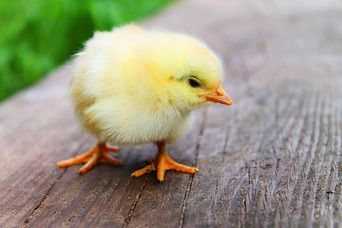Chicks as Easter Gifts: Advice for Clients
A popular gift during the Easter holiday is live chicks, but this tradition is harmful to both the baby animal and the new pet owner. The experts’ advice: Don’t do it.

Giving chicks as Easter gifts is a popular tradition for many. But experts say this tradition is doing more harm than good for the animals. If any of your clients ask for advice about purchasing one of these baby birds, here is some good advice to give them.
Many of these animals live only a short time due to improper care, neglect, or a stressful environment. Because Easter chicks are often purchased in the moment, many new owners forget about the special feeding and care their new pet requires.
Chickens are not the easiest of pets to own. They have specific housing requirements, require a specific diet, and need to be handled in a specific way.
- Housing: Chickens need a brooder. A brooder is a place where chickens can run around but also be protected from other animals.
- Diet: Baby chicks require special feeding. They need to start with crumbles, then switch over to whole grains and grit. Fresh, clean water is necessary, as well as litter for their environment to remain sanitary.
- Life Care: Chickens live long lives. The novelty of a baby chick wears off quick when owners find out that they can live up to 16 years. People who can’t make that commitment should buy a baby chick.
Another important thing to remember is the potential risk for Salmonella that chickens bring with them. Young birds—chicks included—often carry this harmful bacterium, which can be spread easily to those handling them. What’s more, some chicks infected with Salmonella show no signs of illness, making it even more difficult to know whether a pet chick has the disease or not. Exposure can happen from kissing, cuddling, or just simply holding the birds.
The Centers for Disease Control and Prevention (CDC) recommends the following when it comes to baby chicks and ducklings.
- Do NOT purchase live animals as Easter gifts. Give toy stuffed animals or animal-shaped chocolates instead.
- Do not let children under 5 years of age handle baby chicks or other young birds. Also keep children away from packages in which chicks or ducklings arrive.
- Anyone who touches chicks, ducklings, or their environment should wash their hands immediately afterward. Pacifiers, toys, bottles, or other objects should not touch the baby birds or their enclosures. If these objects do become contaminated, wash them with warm soapy water.
- Do not allow anyone to eat or drink while interacting with birds or their environment. Keep the bird area separate from areas where food and drink are prepared or consumed. Do not allow chicks or ducklings on table surfaces or places where food will be prepared or eaten.